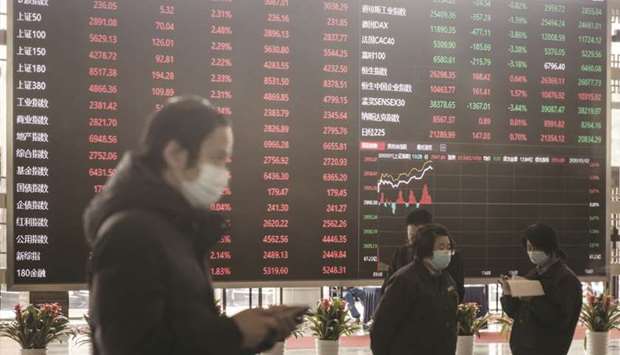China’s success in luring foreigners into its domestic debt market, the world’s second largest, faces a new test in coming months as officials try to drum up interest in a record wave of bonds from local authorities.
International funds now hold 8.6% of China’s central government bonds, several times more than the share just several years ago, and not terribly far from the 13% overseas stake in Japanese sovereigns. Inflows continued through the coronavirus crisis, and the US trade war.
Officials are hoping that interest might extend to local government notes, where foreign ownership is merely 0.01%. Issuance will climb to 4.73tn yuan ($666bn) this year to help bolster economic growth that is expected to be the worst since the 1970s.
“As China’s local government bond market is expanding quickly, regulators need to attract more diversified investors, including foreigners,” said Zhou Guannan, an analyst with Huachuang Securities Co in Beijing.
She said that would help “alleviate pressure on banks” – which are usually dominant buyers, but are now burdened by mounting bad loans and requests to keep credit flowing to businesses.
Problem is, that legacy of bank purchases has left the local government bond market even less readily tradable than for central government bonds. That’s because the banks typically buy and hold – making it more costly to exit a position should a foreign investor need.
Plus, yields on these bonds generally don’t offer a premium over debt from so-called policy-banks – lenders owned by the central government that often carry out Beijing’s policy objectives. Given such disadvantages, overseas investors have a negligible share of the 21tn yuan of local government debt outstanding as of the end of 2019, more than a fifth of the entire domestic market.
Despite their huge overall size, the average value of a single local bond is as small as just about 6% of a central government note.
That’s because there are nearly 5,800 outstanding – more than 20 times that of sovereign bonds.
“Liquidity is diluted among the numerous local government bonds and so trading is inefficient,” said Felix Sun, head of fixed-income at UBS Securities Co. in Shanghai.
Trading in the local bonds was just 5.3tn yuan in the first five months of the year, slightly more than a quarter of that in sovereign notes, where the total supply outstanding is 30% less.
“We don’t buy local government bonds,” said Edmund Goh, Asia fixed-income investment director at Aberdeen Standard Investments in Shanghai. “The spread between local government bond and central government bond is too narrow, and the liquidity is bad.”
Chinese regulators are aware of the problems, and are determined to build on the record of success getting fund managers abroad to see the attraction of diversifying into China’s debt.
Efforts will be made to “improve the liquidity of local government bonds in the secondary market,” Xu Jinghua, an official with the Ministry of Finance’s treasury department, said at a briefing, though she stopped short of spelling out specifics.
Authorities will “steadily push forward the opening up” of the local debt market as they aim to “ensure smooth issuance” of government bonds this year, Xu said.
At the end of the day, it could all come down to price. “I may consider buying some LGBs if they can provide spreads of 30 basis points over policy bank notes,” Goh said.

Employees and visitors wearing protective masks walk past an electronic stock board at the Shanghai Stock Exchange. China’s success in luring foreigners into its domestic debt market, the world’s second largest, faces a new test in coming months as officials try to drum up interest in a record wave of bonds from local authorities.
